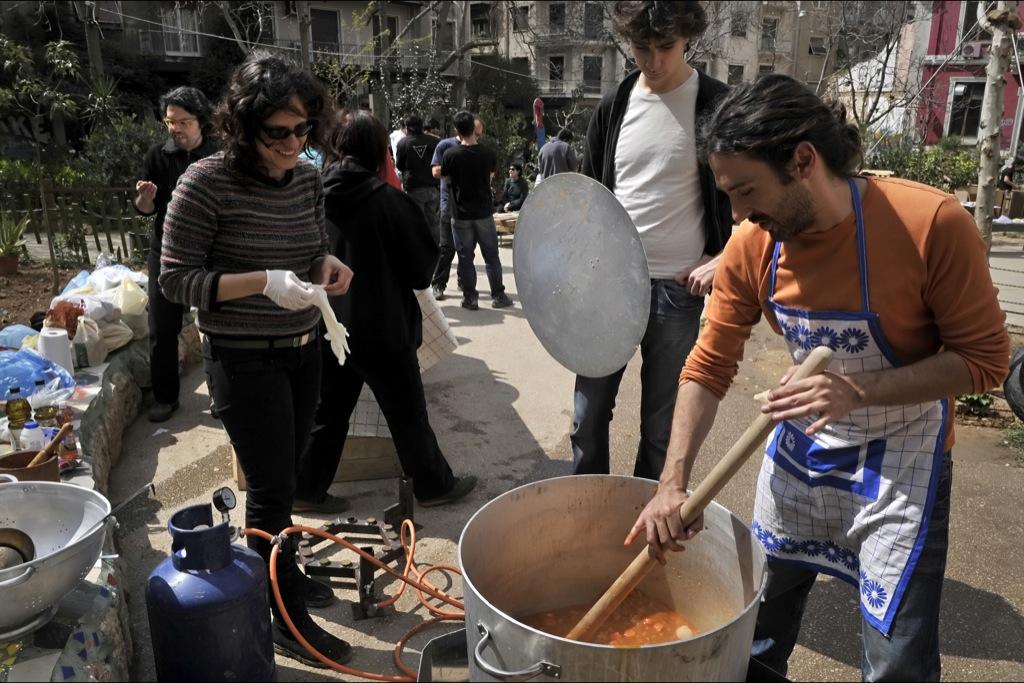Euro crisis: Growing up hungry in Greece
A volunteer stirs lentils at a community organized soup kitchen in Athens. But such efforts haven’t been able to feed everyone who comes and many remain hungry.
ATHENS/PATRAS, Greece — Μarcos Efcarpos is only 10 years old, but he already knows what the euro crisis means.
He lives with his single mother, an English teacher named Nena, in an apartment in the poor, waterfront neighborhood of Kallithea, where a growing number of immigrants jostle with far-right gang members affiliated with neo-fascist party Golden Dawn.
Incomes here have plummeted since the start of the financial crisis in 2008, especially after international lenders imposed debt repayments on the country two years ago.
“My family still pays taxes but very soon we won’t be able to buy what we need,” said Marcos, who plays guitar and appears older than his age. “That’s why we’re careful with what we spend — we have very few possessions.”
Nena works 11 hours a day, six days a week to support her son. But although she often runs out of money by the end of each month, she considers herself lucky because her parents send fruit and vegetables from their rural garden.
Marcos rarely begs for new purchases. “He’s learned to ask if we have money for something he wants,” Nena explained. “We have a new slogan: ‘Fewer needs, fewer worries.’”
Despite his straitened circumstances, Marcos is doing well for a Greek child. Many others are growing up hungry, a stark result of austerity measures such as wage cuts and tax increases that were prompted by the country’s three-year drive to repay its debts, and are affecting almost every part of the population.
More from GlobalPost: Spanish borrowing costs put new pressure on euro zone
Estimates for the number of children living below the poverty line vary. The EU’s official figure, 439,000, or 23 percent of the population under 18, increased a mere 2 percent since 2009. However, that number is derived from the current Greek median wage.
Child poverty specialist Matsaganis Manos says the number probably jumped “dramatically” between 2009 and 2011 — to 35 percent — if current earnings are compared to what Greeks made before the crisis. And the government’s decision to cut the minimum wage by a fifth earlier this year is “bound to make things even worse for families with children,” he said.
The changes in Greek society are clear on the streets. Social workers say some poor Athens neighborhoods are experiencing close to a humanitarian emergency.
“People are beginning to starve,” said Aglaia Konstantakopolou, who works at a soup kitchen and social center in downtown Athens originally planned for refugees. “Mothers come begging for diapers, milk for their children or food,” he added. “Two years ago, you never saw anything like that.”
Teachers say children often show up to class hungry. Many skip classes to eat breakfast at charity shelters, Konstantakopolou says.
The physical strains are producing psychological effects, especially among younger children who often blame themselves for the effects of the crisis.
“When parents can’t buy clothes or toys, children believe they’ve been bad and are responsible,” child psychologist Salemi Parrisia said.
There are reports of growing numbers of malnourished children collapsing at school and suffering health-related phobias.
More from GlobalPost: British military fears irrelevance
Although cuts to social services are partly to blame for those dire developments, some children’s advocates say Greece’s notorious bureaucratic inefficiency is even more responsible.
UNICEF Greek director Ilias Liberis blames “structural weaknesses” among a profusion of overlapping agencies for harming efforts to protect children.
“There are many different services and organizations helping children,” he said, “but no central coordination.”
However, public anger over austerity, corruption and the failing economy has drowned out calls to reform child services.
Already one of Greece’s poorest cities, the western port of Patras has been badly hit by the crisis. The city council estimates the number of poor has more than doubled in less than a year.
At the city’s Greek Orthodox cathedral, employees at a soup kitchen prepare daily basic lunches of beans, olives and fruit.
“The number of people who come begging grows every day,” says cook Konstantina Nikolinakou. “We made food for 30 people before the crisis. Now we serve 120.”
She says there is never enough for everyone. “We can’t chase them away.”
Outside the soup kitchen wait 38-year-old Maria Papanikolaou and her 11-year-old son Petros, hoping for leftover scraps. A former accountant, Papanikolou fell on tough times when the company she worked for closed last September.
“When I grow up, I’ll take my mother far away from Greece,” said Petros. “I promised her we’ll go to an island where I’ll be a fisherman. So we’ll have food to eat and be happier than now.”
Skoulis reported from Athens and Patras, McPhedran from Berlin.
More from GlobalPost: Olympic profile: Amélie Cazé
The story you just read is accessible and free to all because thousands of listeners and readers contribute to our nonprofit newsroom. We go deep to bring you the human-centered international reporting that you know you can trust. To do this work and to do it well, we rely on the support of our listeners. If you appreciated our coverage this year, if there was a story that made you pause or a song that moved you, would you consider making a gift to sustain our work through 2024 and beyond?
